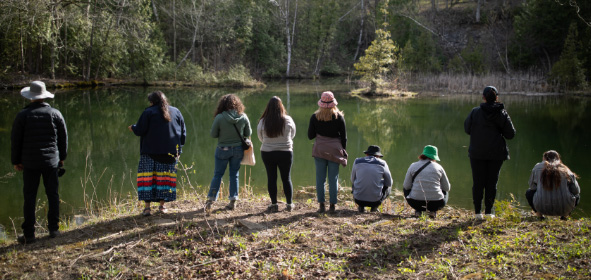EXPERIENTIAL LEARNING COURSE AND PROGRAM DEVELOPMENT RESOURCES
These resources for faculty and staff were developed by Professor Ashley Stirling, Vice Dean of Academic Affairs in the Faculty of Kinesiology & Physical Education and are designed for self-directed learning. Pedagogically grounded and empirically informed, the resources were created in consultation with a tri-campus working group and draw upon the collective expertise and experiences of faculty and staff across the institution. They focus on advancing the quality development and delivery of both curricular and co-curricular experiential learning opportunities. There are also a suite of student-facing modules that you may wish to incorporate into your experiential learning course or program.
EXPERIENTIAL LEARNING 101
Explore the theoretical foundations of experiential learning.
PURPOSEFUL EXPERIENCE
Discover key considerations for an impactful learning experience.
REFLECTION
Examine various forms and frameworks for reflection.
DESIGNING THE EXPERIENCE
Learn about logistics, matching and preparation.
ADMINISTRATIVE REQUIREMENTS
Review some of the administrative requirements and institutional policies and guidelines related to experiential learning.
ACCESS & ACCESSIBILITY
Support inclusive student learning experiences.
BUILDING PARTNERSHIPS
Consider how to build and maintain ethical partnerships.
STUDENT MODULES
These editable and open source student-facing modules are to be used by instructors and staff offering experiential learning courses or programs.
REMOTE EXPERIENTIAL LEARNING RESOURCES
This page houses a range of resources available to faculty and staff as they design, implement and administer remote experiential learning opportunities. The below modules are based on and developed from the “Adapting Experiential Learning for Remote Delivery” webinar series that was held during the Summer Term 2020. Below these resources, we have also included quick links to a number of additional remote resources that may be of interest.
While these presentations and resources were initially developed as a direct response to COVID-19, these resources remain valuable for faculty and staff interested in exploring virtual and remote experiential learning in any context.
Effective Partnership Development and Engagement
Explore resources for developing and maintaining remote and virtual partnerships.
Recording for Remote Teaching
Guidance, tips, and tricks on the best ways to produce high-quality online materials for field courses.
Field Experiences
Remote course design and implementation considerations for field-based experiences.
Research Intensive Courses
Explore strategies for design of authentic and motivating research experiences.
Organization-Partnered Projects
Remote considerations for project-based experiential learning partnerships.
Academic Internships
Guidance on preparation for remote internships, risk management, reflection and assessment.
Designing Remote Activities to Spark Student Engagement
Rethinking design principles for teaching, social and cognitive presence, and practical strategies for teaching remotely.
ADDITIONAL REMOTE EXPERIENTIAL LEARNING RESOURCES
Click on the links below to learn more about these supports and resources designed for virtual experiential learning.
- Community Partner Engagement and CEL Course Strategies in COVID Times: Strategies for effective partnership-building with non-profit, public and grassroots organizations for CEL course design and delivery during the pandemic.
- FAQ for Coordinating Field Experiences During COVID-19: Guide for designing field remote and virtual field experiences.
- Community-Engaged Learning in Online Spaces: A guide for instructors on creating virtual Community-Engaged Learning.
- Technology Tools Beyond Quercus: CTSI overview of educational technology tools.
- Online Privacy Protection: An overview of privacy concerns and considerations.
- Tips for Supervising Students Remotely: CEWIL developed resource for student support and engagement in a remote environment.
- Supporting Students Navigating Remote Experiential Learning: CEWIL created resource for helping students navigate remote experiential learning.
- Remote Experiential Learning Design Considerations: Course design in remote environments.
- Facilitating Synchronous Remote Experiential Learning Events: How-to guide for facilitating and leading virtual EL events.


